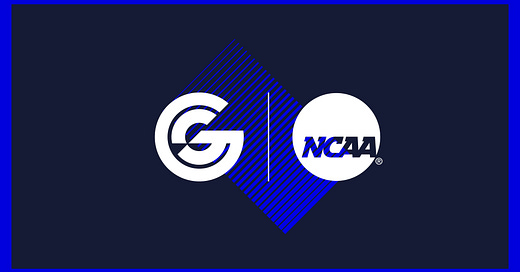Friday Feature: What the NCAA + Genius Sports Betting Deal Means for College Athletics, NIL, and Gambling Law
From ‘Arms-Length’ to Revenue Share: A Sea-Change in NCAA Gambling Policy
For six years, the NCAA’s public talking points have been that legal wagering imperils amateur sport, subjects athletes to harassment, and increases point-shaving risk. Last week, the organization quietly steered in the opposite direction, expanding its Genius Sports partnership to let the London-based data broker sell live, official statistics from every NCAA championship to U.S. sportsbooks through 2032.
On paper, the contract merely grafts college properties onto the pro-league model that already delivers the NFL, NBA, and MLB tens of millions in annual “integrity-data” fees. Behind the press release, however, sit three thorny legal questions that will shape college sports over the next decade.
First, who owns the data? By limiting the scope to championship events, the NCAA skirts messy property-rights fights with individual schools and FBS conferences, but it also concedes that regular-season and bowl-game information may belong elsewhere. Expect conferences such as the Big Ten and SEC to press the issue as media-rights renewals loom.
Second, can states restrict wager types while the NCAA sells the feed? Baker’s deal flips the existing lobbying script. Legislators who have enacted or are contemplating bans on player-prop bets (Ohio, Vermont, Louisiana, New Jersey) must now square those restrictions with a governing body that is monetizing the same marketplace. The tension heightens dormant-commerce and equal-protection arguments for operators shut out of “official” data.
Lastly, does revenue sharing create athlete-compensation claims? Once the House settlement takes effect (whenever that will be), direct pay to athletes will become an NCAA-sanctioned expense item. When the organization itself begins deriving new cash streams from gambling, antitrust plaintiffs will almost certainly argue that athletes deserve a share of this pie as well.
Integrity Clauses: Contractual Guardrails or Liability Trap?
The NCAA heralded the agreement’s integrity language: books that subscribe to the Authorized Gaming License (AGL) must withhold “high-risk” wagers (injury, under-performance, and negative-outcome props) and furnish geolocation/device data in future investigations. From a compliance perspective, those promises accomplish two things:
Data Discovery: In past match-fixing cases, subpoena fights delayed or derailed investigations. By inserting cooperation obligations as a condition precedent to data access, the NCAA converts civil discovery into a contractual right.
Affirmative Duty to Monitor: Once an operator agrees to share suspicious-bet alerts in real time, failure to do so can support breach-of-contract and negligence theories. In effect, the NCAA has outsourced elements of integrity policing to the same entities that profit from the handle.
Yet those clauses also import new legal exposure. If a future scandal erupts (think 1990s Arizona State point shaving, but fueled by the NCAA’s feed), plaintiffs may target the association for negligent licensing, arguing that it knowingly partnered with an operator that failed to flag anomalies. The indemnification language, which has not been released, will be critical. Universities may demand hold-harmless protections before allowing their IP to flow through the pipeline.
NIL & Sportsbook Synergies: A Coming Collision
The deal expressly disclaims “sportsbook sponsorships,” but NIL collectives and brand agencies will also see an opportunity. For example, consider opt-in player data, featuring real-time shot-tracking or biometric overlays, which could become sponsorship inventory for tech-savvy athletes in basketball, volleyball, or baseball. This raises HIPAA and personal-data-rights issues that universities have only begun to analyze. Moreover, consider in-venue betting lounges at championship sites. While I am not insinuating that the Palestra will turn into Caesar’s Palace, a revenue-share with Genius may soften the NCAA’s stance on signage, advertisement, and even betting lounges by 2027-28. As for protection for the athletes, they could object under state NIL statutes that bar commercial use of their persona without consent, but many will probably opt in to boost their NIL earnings. Expect bargaining over “group licensing” carve-outs in event contracts. For now, the NCAA says new revenue will fund problem-gambling education and harassment monitoring. Whether those earmarks satisfy state attorneys general remains to be seen, as several have already opened inquiries into university-sports book advertising (e.g., Colorado, Maryland).
A Compliance Checklist for Athletic Departments to Consider:
Contract Review: Examine existing data-rights clauses in multimedia, ticketing, and Wi-Fi agreements to ensure no inadvertent breach when Genius staffers enter venues to capture feeds.
Prop-Bet Mapping: Distribute to coaches and student-athletes a live chart of permissible vs. banned wager types in every state where your teams compete. Ignorance will not be a defense after the first suspension.
NIL Policy Update: Add a section addressing individual data licensing and revocable consent for wearable-tech integrations.
Harassment Reporting Protocol: Coordinate with campus police on the NCAA’s new geolocation request process so subpoenas arrive at the right office.
Conclusion: Federal Preemption or Fragmentation?
Congress has shown little appetite for broad gambling legislation, yet Baker’s Senate testimony and the new data deal push lawmakers toward two divergent paths. First, the preemption model would involve a single federal statute banning college player-props, mandating data-sharing with integrity units, and immunizing leagues that adopt “commercially reasonable” safeguards. (Similar to the 1984 Amateur Sports Act for betting.) Second, a patchwork 2.0 of sorts would allow states to continue to tweak wagering menus while universities sign one-off data or sponsorship deals, creating regulatory arbitrage that mirrors the current NIL landscape.
Given election-year gridlock, fragmentation is the short-term favorite. That reality heightens the importance of contractual clarity: the Genius-NCAA agreement is now the template every conference, bowl game, and even individual school will study and adapt when monetizing its data. Whether that template becomes an industry standard or a cautionary tale will depend on two variables no spreadsheet can predict: match-fixing scandals and public backlash.
For practitioners, the message is simple. Data is the new media right; integrity is the new antitrust defense. College athletics has just become an even bigger business, and every contract drafted after April 25 must account for the risks the NCAA has willingly assumed.





